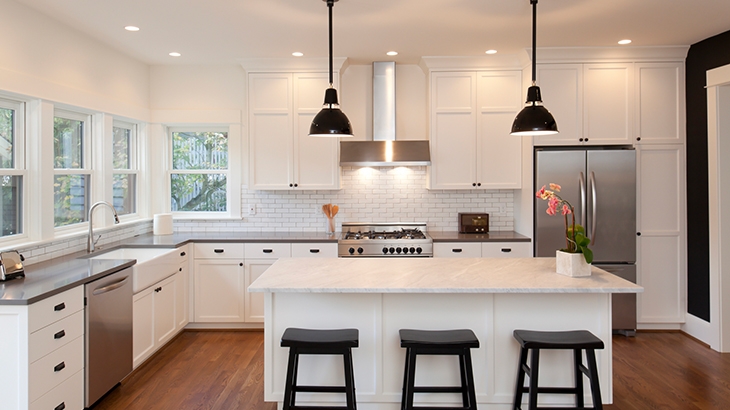Tips to Downsize Your Home
Whether you're a recent empty nester or simply looking to lower the size of your mortgage, many Americans are now opting for smaller houses—bucking a century-long trend of building bigger. But if you're used to bonus rooms and basements, downsizing from a large home with rooms to spare to a smaller, more functional house can be a frustrating transition. This is especially true when decluttering a lifetime of belongings. As you consider downsizing, really think about and define your needs so you can find the right house for you—or stay put if your current home meets your needs better than you might think.

How to Declutter and Downsize Your Stuff
If you're still thinking about downsizing, take some time before you start hunting for a new place. This way, you know how much space and how many rooms you actually use on a daily basis since most of us tend to fill whatever space we have, regardless of the size of that space. If you're used to a larger home, it's easy to confuse how much space (and stuff) you really need because, well, you're used to having what you have. Use these tips to help you declutter and keep what you really need:
- Go one area at a time: Let's be real—decluttering can be overwhelming! Start with one room, one area at a time. You could start with the closet, desk, or dresser and go from there. If you haven't started looking, you have the time to go through things slowly and not make a mess of your house in the process.
- Keep a donation box in the garage or closet: this way, when you come across something, you can just place it in the box, and it's ready to go when you're ready to donate. With this method, you also don't have to wait to be prepared to start going through things, and it'll be easier to go through when you are ready.
- Get organized and de-dupe: Depending on your space, it might make sense to start with one type of item (like clothes) and have just one area for each item so you can see how much you actually have. Once you gather all the pens in the house, for example, you might find that you have a nice collection and could gift or toss a small store's worth. This will help you declutter and get organized as an added bonus, and you won't be losing space to duplicate items. When was the last time you needed four giant stockpots at the same time?
- Gifting the good stuff: Go through your things and take a practical look at each item. When was the last time it was useful to you? If it's a family heirloom, think about who would appreciate it most and gift it to them. As an added bonus, you'll get the joy of seeing an item you loved being put to good use and enjoyed by a loved one. If you want to go that route, set a time limit for them to pick it up or decide they want it so you can gift to someone else.
- Scan old paperwork: Storing it electronically instead will still give you access to the important paperwork you don't need printed copies of. It's still a good idea to have a scanned version of those, too, just in case something happens to the physical version so you can still access it. Consider doing the same with recipes if you're a tech-savvy cook.
- Adult "kids" memorabilia: As a parent, it's natural to keep things from their childhood, like yearbooks or photos. But you can't keep everything. Send these things along to their respective houses so they can share with their kids or cherish for themselves.
- Furniture: It's tempting to just keep all your things, but a big house usually means big furniture, which means it just won't fit in a smaller house. Decide which pieces you'll really want to hold onto when you move and sell or donate the rest.
Moving to a Smaller House
Moving is a bit of a headache in general, but losing a lot of square footage is a unique challenge. Now that you've gone through all the rooms in your house and have purged as much as you can, it's time to begin the search. Try to avoid making spaces to entertain, a basement for the grandkids, or extra bedrooms for relatives your top priorities while shopping for a new home. Instead, focus on what makes sense for your financial future. This way, you won't find yourself in the same position down the road with downsizing.
Now for the more practical tips. When you downsize, you have other costs that should be factored in before you make the move. This includes buying new furniture that will fit a smaller space, the cost to move (renting a truck, paying for movers), potential storage fees if you didn't declutter as much as was needed, and maintenance costs on your new property. Generally, those costs are lower with a smaller house, but if it has a bigger yard or wasn't well maintained, you could end up spending more than if you stayed put at your old house. Lastly, consider your future. Does the new house you're considering have a lot of front steps? Does it have room to install a ramp if needed? You never know what life will be like down the road, so it's good to take that into consideration, just in case.
Lastly, give yourself time to adjust. Moving to a smaller house might leave you feeling a bit cramped, but with some creative organization and multi-functional furniture, it will feel more comfortable, and you'll have less maintenance than before. Take your newfound time and do the things that bring you joy!
WaFd Bank is Here to Help
When it comes to getting your finances in order for the ups and downs of life, a little planning goes a long way. Whether you're a seasoned budgeting pro or new to saving (check out WaFd Bank's account options while you're here), your local WaFd Bank branch is available to help you reach your financial goals. Open an account online, visit your local branch, or give us a call at 800-324-9375 to learn more and open an account today.
All loans subject to credit approval.
Did you find this article helpful? Share it!


